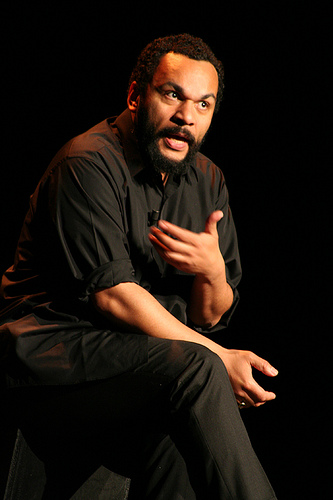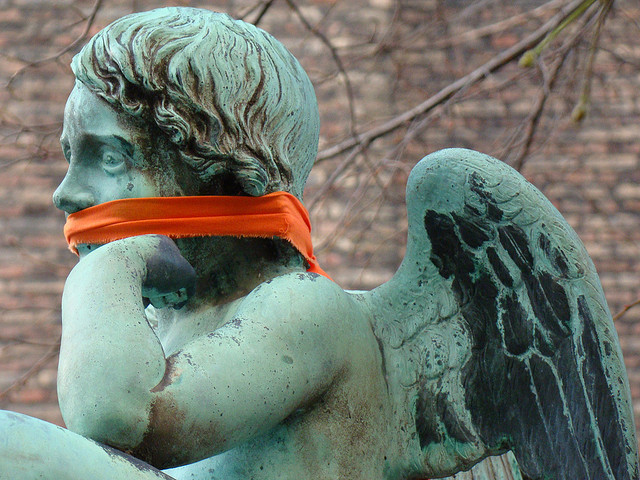The Home Office’s exclusion of Dieudonné raises important issues regarding the protection of freedom of expression
The recent exclusion from the UK of French comedian Dieudonné M’Bala M’Bala raises important questions concerning the limits of freedom of expression. Whilst restrictions are certainly permissible under UK and European law, their justification must be clearly laid out, if freedom of expression is not to be unduly limited, says Claire Overman.
The controversial French comedian Dieudonné M’Bala M’Bala was reputed to be seeking to travel to the UK in order to support footballer Nicolas Anelka, who faces a disciplinary hearing following his use of an anti-Semitic gesture during a football match. However, in a circular reportedly leaked to a Swiss newspaper, the UK Home Office ordered that M’Bala M’Bala was not the be permitted entry to the country. The reason for his exclusion from the UK is not clear from the circular; however, it appears that it is linked to the recent banning of several of his shows in France due to their racist and anti-Semitic content. The comedian also has previous convictions for inciting racial hatred.
The fact that an individual may be banned from the UK on this basis has obvious implications for freedom of expression. In the UK, this freedom is protected by Article 10(1) of the European Convention on Human Rights (ECHR), incorporated into English law through the Human Rights Act 1998. This Article states that “everyone has the right to freedom of expression,” encompassing “freedom to hold opinions and to receive and impart information and ideas without interference by public authority.” Significantly, this right is one of the few whose importance is also mentioned within the body of the Human Rights Act itself: section 12(4) holds that “the court must have particular regard to the importance of the Convention right to freedom of expression.”
However, this right is not without limits. Article 10(2) ECHR states that freedom of expression “carries with it duties and responsibilities,” and therefore it is subject to restrictions which are “prescribed by law and…necessary in a democratic society.” Further, these restrictions are required to correspond to one of the listed aims within the Article; these range from “national security” to “the prevention of disorder and crime” and “the protection of health or morals.”
 This wide range of possible justifications for restricting freedom of expression raises interesting dilemmas when, as in the present case, the speech in question is offensive or racist. The European Court of Human Rights (ECtHR) has maintained that freedom of expression is applicable “not only to information or ideas that are favourably received or regarded as inoffensive or as a matter of indifference, but also to those that offend, shock or disturb the State or any section of the population.” Indeed, it is in relation to such speech that the need for its protection against State interference is the strongest: uncontroversial speech is unlikely to be restricted. However, the ECtHR has also drawn a number of bright lines, notably, for present purposes, with respect to racist speech, anti-Semitism and Holocaust denial. Such expression is held to be outside the protection of Article 10. Racist speech in the UK is also a criminal issue: Part III of the Public Order Act 1986 sets out the offences of inciting or stirring up racial hatred.
This wide range of possible justifications for restricting freedom of expression raises interesting dilemmas when, as in the present case, the speech in question is offensive or racist. The European Court of Human Rights (ECtHR) has maintained that freedom of expression is applicable “not only to information or ideas that are favourably received or regarded as inoffensive or as a matter of indifference, but also to those that offend, shock or disturb the State or any section of the population.” Indeed, it is in relation to such speech that the need for its protection against State interference is the strongest: uncontroversial speech is unlikely to be restricted. However, the ECtHR has also drawn a number of bright lines, notably, for present purposes, with respect to racist speech, anti-Semitism and Holocaust denial. Such expression is held to be outside the protection of Article 10. Racist speech in the UK is also a criminal issue: Part III of the Public Order Act 1986 sets out the offences of inciting or stirring up racial hatred.
Interestingly, in the USA, the First Amendment’s guarantee of freedom of expression has been interpreted much more broadly be the courts, and, as a result, racist speech is treated very differently. For instance, it was held in the case of RAV v City of St. Paul that a prohibition on speech communicating messages of racial, gender or religious intolerance was unconstitutional, as seeking to “handicap the expression of particular ideas.” In that case, the conduct which the State sought to restrict was the burning of a crucifix on the lawn of a black family. It is therefore far from clear that there is something “intuitively” right about treating racist speech differently from other types of offensive speech, as has been the case in the UK and Europe.
A better argument in support of the Home Office’s actions may be that speech ought to be restricted where it affects the rights of other individuals. Indeed, at the European level, Article 17 ECHR states that none of the rights laid out within it allow “any State, group or person any right to engage in any activity or perform any act aimed at the destruction of the rights and freedoms set forth herein.” Further, the UK, with its laws against defamation, has recognised that where speech causes damage to another, it is to be subject to restrictions. However, this argument runs into problems when we consider that sexist or ageist speech, for instance, is not treated in the same way as incitement to religious or racial hatred. If the justification is that racist speech is to be prohibited on the basis of the harm it causes to others, then it must surely be the case that speech inciting any type of harm to others should be treated similarly.
On the other hand, from an empirical perspective, it is clear that in reality racial and religious hatred pose a far greater threat to individuals, and to public order, than age-based hatred. It is perhaps this empirical argument that provides the best justification for restrictions on speech that is shown to cause the most harm.
It is clear that the UK government has acted within the law in purporting to restrict the right of individuals such as M’Bala M’Bala from expressing racist or anti-Semitic ideas (whether this warrants his exclusion from the country is another issue). However, given the importance of the right to freedom of expression, it is necessary to give real thought to the justification for any restrictions imposed on it. Such justification can, it seems, be found, but to appeal simply to the offensiveness of racist speech risks irreparably undermining freedom of expression.
—
Note: this post represents the views of the author and not those of Democratic Audit or the LSE. Please read our comments policy before posting. Inset image credit: AlexandreHervaud, CC by NC SA 2.0. The shortened URL for this post is: https://buff.ly/M62GsP
—
 Claire Overman is a BPTC student at Kaplan Law School, having studied for a BA and BCL at the University of Oxford and the Université de Paris. She is an editor of the Oxford Human Rights Hub.
Claire Overman is a BPTC student at Kaplan Law School, having studied for a BA and BCL at the University of Oxford and the Université de Paris. She is an editor of the Oxford Human Rights Hub.






 Democratic Audit's core funding is provided by the Joseph Rowntree Charitable Trust. Additional funding is provided by the London School of Economics.
Democratic Audit's core funding is provided by the Joseph Rowntree Charitable Trust. Additional funding is provided by the London School of Economics.
The Home Office exclusion of Dieudonné, a protection of freedom of expression issue? https://t.co/Cf6d7p0OhJ
Is there a right to be offensive? Claire Overman on the French comedian controversy https://t.co/anEetQN4B1
The Dieudonné case and the right to be offensive in a free society https://t.co/NcjrXPQOm4
A free society that allows for unencumbered hate speech can easily become an unfree society @democraticaudit @InTheSoupAgain
.@democraticaudit Dieudonné’s neo-Nazi fans/Far Right FN friends would agree with such sentiments, but others versed in 1930s beg to differ
It is an interesting question indeed. And cases like RAV don’t make it very easy.Also, as you rightly point out a principled approach also leads to some dilemmas (“If the justification is that racist speech is to be prohibited on the basis of the harm it causes to others, then it must surely be the case that speech inciting any type of harm to others should be treated similarly.”) But a principled approach needs to be found – especially in context of freedom of speech v. equality considerations.
In India too – there a major controversy in relation to a book on Hinduism by Wendy Doniger that has been pulped by the publishers after threats by fundamentalist groups that it ‘offends’ Hindu sentiments. The difference, however, is that in India – it’s supposedly ‘offending’ a group that does not have a past of historic, systemic oppression/discrimination (as was the case in RV and here). Rightfully so, this move has been subject to a lot of criticism. However, issues like these highlight the need some clarity in terms of principles as there is a chance that we overestimate/underestimate the issue of offensiveness.
Interesting blog on Home Office’s exclusion of Dieudonné and protection of freedom of expression. @democraticaudit https://t.co/jmnE8bqWKB
Does controversial French comedian Dieudonné have the right to express his views in the UK? https://t.co/URo5Dh79Xx
Reconciling freedom of expression and racist speech. My post on M’Bala M’Bala’s exclusion from the UK: https://t.co/GUJj8crPjX
The Home Office’s exclusion of Dieudonné raises important issues regarding the protection of freedom of expression https://t.co/4iv7e4LI9Y
The Home Office’s exclusion of Dieudonné raises important issues regarding the protection of freedom of expression https://t.co/I4sMRcHhcY